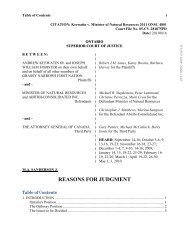Bhatia International v. Bulk Trading S.A. & Anr
Bhatia International v. Bulk Trading S.A. & Anr
Bhatia International v. Bulk Trading S.A. & Anr
Create successful ePaper yourself
Turn your PDF publications into a flip-book with our unique Google optimized e-Paper software.
http://JUDIS.NIC.IN SUPREME COURT OF INDIA Page 5 of 12which gives them in a state requiring varying degrees of furtherprocessing". (see Corrocraft Ltd. vs. Pan American Airways (1968) 3WLR 714 at page 732, AIR 1975 SC 1951 at page 1957. If a languageused is capable of bearing more than one construction, in selecting thetrue meaning, regard must be had to the consequences, resulting fromadopting the alternative constructions. A construction that results inhardship, serious inconvenience, injustice, absurdity or anomaly orwhich leads to inconsistency or uncertainty and friction in the systemwhich the statute purports to regulate has to be rejected andpreference should be given to that construction which avoids suchresults. (see Johnson vs. Moreton (1978) 3 All. ER 37 and Stock vs.Frank Jones (Tipton) Ltd. (1978) 1 All. ER 948). In selecting out ofdifferent interpretations the Court will adopt that which is justreasonable and sensible rather than that which is none of those things,as it may be presumed that the legislature should have used the wordin that interpretation which least offends our sense of justice. InShanon Realites Ltd. vs. Sant Michael (924) A.C. page 185 at page192-193 Lord Shaw stated, "where words of a statute are clear, theymust, of course, be followed, but in their Lordships opinion wherealternative constructions are equally open that alternative is to bechosen which will be consistent with the smooth working of the systemwhich the statute purports to be regulating and that alternative is tobe rejected which will introduce uncertainty, friction or confusion intothe working of the system." This principle was accepted by SubbaRao, J. while construing Section 193 of the Sea Customs Act and incoming to the conclusion that the Chief of Customs Authority was notan officer of custom. (AIR 1961 SC 1549).16. A reading of the provisions shows that the said Act applies toarbitrations which are held in India between Indian nationals and tointernational commercial arbitrations whether held in India or out ofIndia. Section 2(f) defines an international commercial arbitration.The definition makes no distinction between international commercialarbitrations held in India or outside India. An international commercialarbitration may be held in a country which is a signatory to either theNew York Convention or the Geneva Convention (hereinafter called theconvention country). An international commercial arbitration may beheld in a non-convention country. The said Act nowhere provides thatits provisions are not to apply to international commercial arbitrationswhich take place in a non-convention country. Admittedly Part II onlyapplies to arbitrations which take place in a convention country. Mr.Sen fairly admitted that Part II would not apply to an internationalcommercial arbitration which takes place in a non-convention country.He also fairly admitted that there would be countries which are notsignatories either to the New York Convention or to the GenevaConvention. It is not possible to accept submission that the said Actmakes no provision for international commercial arbitrations whichtake place in a non-convention country.17. Section 1 of the said Act reads as follows:"1. Short title, extent and commencement.- (1) ThisAct may be called the Arbitration and Conciliation Act,1996.(2) It extends to the whole of India:Provided that Parts I, III and IV shall extend to theState of Jammu and Kashmir only in so far as they relateto international commercial arbitration or, as the case maybe, international commercial conciliation."The words "this Act" means the entire Act. This shows that the entireAct, including Part I, applies to the whole of India. The fact that allParts apply to whole of India is clear from the proviso which providesthat Parts I, III and IV will apply to the State of Jammu and Kashmir
















